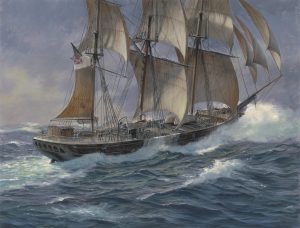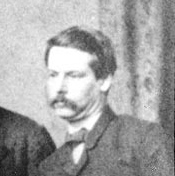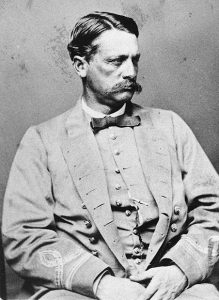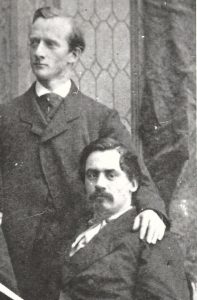A Confederate New Year Far, Far Away

December 31, 1864: The CSS Shenandoah—the remotest and loneliest outpost of the beleaguered Confederacy—stretched her wings with all sails set as she surged across the Indian Ocean.
Her officers were a cross section of the South from Maryland, Virginia, North and South Carolina, Georgia, Mississippi, Louisiana, and Missouri. All but two, the captain and the ship’s surgeon, were under the age of twenty-five.
All had suffered three and a half years of bloody, discouraging conflict aboard puny gunboats and lumbering ironclads up and down the interior waters of their fledgling country, frequently aboard the same vessels or in the same battles. The men of Shenandoah finally were taking the fight to the enemy in a fine blue-water ship. They did not all serve for the same reasons but stood together in defense of their country as they understood it, pursuing a difficult mission in which they would succeed spectacularly after it no longer mattered.
Shenandoah departed London the previous October on a globe-straddling, thirteen-month cruise to destroy Union commerce. Seven Yankee merchants and one whaler had been burned and sunk on the way down the Atlantic. Captured sailors were either recruited or released on foreign shores; there were no casualties.
These Southerners were months out of touch with several thousand miles of cold, storm-swept and empty waters between them and their next stop in Australia. In a few days—as noted in his personal journal by ship’s surgeon, Dr. Charles Lining—Shenandoah would cross the meridian just opposite on the globe from Charleston, South Carolina, and so, every additional mile would bring him closer to his home. After suffering through a terrible typhoon over Christmas (see archive post), New Year’s eve was one of the most beautiful days they had seen.

The air was soft and balmy, recalled Master’s Mate Cornelius Hunt, “like the month of May in our own sunny South.” The heavy sea exhausted its mad passion and died away into long undulating swells.
It was the last of the old year, wrote Lining, “and a pleasant year it has been to me, taken all in all…. But where will I be a year hence from today? Echo can only answer, where? Nothing of any interest going on….” He had been suffering from a headache and would see the old year out with another drink to his little darling whom he longed to see.[1]
Captain James Waddell resumed evening games of whist in his cabin. Midshipman John Mason enjoyed a rubber with the captain, first lieutenant, and assistant surgeon before retiring to his bunk in the steerage, where someone brought out a brandy bottle and proposed a toast to sweethearts and wives followed by “success to the cause.”

Waddell reflected on the occasion:
“Thirty-first of December closed the year, the third since the war began. And how many of my boon companions are gone to that bourne from whence no traveler returns! They were full of hope, but not without fears, when we last parted. They had fallen in battle in defense of their homes invaded by a barbarous enemy.
“War, when waged by unprincipled and brutal civilized man, is always more savage and inhuman than when waged by the untutored savage of the woods. The Yankees in their invasion of the South, came with all the vices and passions of civilized men added to the natural ferocity of the savage. They had no magnanimity or chivalry ; they fought on calculation of profit.
“This fact never left my mind, and reconciled me to the destruction of property which was captured. I felt I was fighting them more effectually than if I were killing the miserable crowds of European recruits which they filled their armies with. For two years they waged war against the South without attempting to interfere with slavery ; it was only when they found the Negro could be used for killing the white people of the South and serve as breastworks for Northern white troops that they declared him free ; it was a new element introduced into the contest, and a very powerful one. They cared nothing for the unhappy Negro ; they preferred his destruction to that of their white troops.”[2]

“This is the last of the year,” recorded First Lieutenant William Whittle in his journal. “I shall sit up, bid it adieu, and welcome the new one in. Oh! May the incoming one be happy. God grant us freedom and peace, I humbly pray. Oh! How many changes may take place in the time which will intervene between this… [and] the last of next year. Oh! God grant us thy blessing upon our dear ones at home; upon my afflicted country. How much would I not give to see the dear ones at home again, and my own darling Pattie. God protect them I pray.”[3]
Master’s Mate Hunt was on watch at midnight when the new year, “wearing all the languid beauty of a Southern clime,” opened. The weather was fine with a light, variable wind; the stars threw their silvery shimmer over the quiet water.
Everyone but the officer of the deck, quartermaster, lookout, and the man at the wheel were wrapped in slumber. “Such were my surroundings when the ship’s bell, striking the hour of twelve, announced the death of eighteen hundred sixty-four and the birth of eighteen hundred sixty-five.” At about 1:00 a.m., Dr. Lining was roused out of his bunk to examine a sailor who had fallen down the hatch. He was stunned but not seriously injured.[4]
New Year’s Day was bright, delightfully pleasant, clear and balmy; all sails set again with just enough breeze to fill them. “How propitious everything looked!” wrote Lieutenant Francis Chew. “Can that day be taken as a specimen of the year in general?” It was the first day of the week and of the month, he noted, the first Sunday in the month, the first day of the new moon, the first time all sail had been carried with studding sails on both sides, and the first day their flag flew for an entire day at sea. “What an enumeration of firsts! May it not be the last time that they occur!”[5]
Shenandoah had been in commission two months, eleven days, and had destroyed or ransomed more property than her original cost, recalled Waddell. “The case is without parallel.” He called all hands to muster, read the Articles of War, inspected the ship and wished them a happy new year. Providence seemed to smile upon them, thought Mason, and everything appeared auspicious. It was the first fine weather they had experienced since entering the Indian Ocean.[6]
New Year’s dinner in the wardroom included two splendid hams adorned with Confederate flags. It seemed a pity to cut them, noted Chew, “however, looking at them was not sufficient for the voracious appetites of some of my messmates.” Hopes for the future were tempered by thoughts of home. “What a waste of waters between me and the shores of my country!”[7]
Lieutenant Whittle thought the dinner nice but was still in a melancholy mood. “This is a day upon which all persons however separated think of their absent dear ones more than on any other. Oh! How my heart feels for my dear ones.” He again invoked God’s blessing and wished for a better and happier new year. “My constant prayer is that a merciful God will guard, protect and cherish our dear country. That he will open the eyes of our enemies to the cruelty of the war they are waging against us and that he may teach them that they are wrong.”[8]
The CSS Shenandoah would face many dangers during her circumnavigation with stops in Melbourne and at the Pacific island of Pohnpei. In the Bering Straits, June 22 to 28, 1865, she captured twenty-four Yankee whalers, burned twenty of them, and released the others with all prisoners. The last gun in defense of the South was fired from her deck near the Arctic Circle ten weeks after Appomattox.
On August 2 off the California coast, they received incontrovertible word of the war’s termination from a British merchant ship. Captain Waddell lowered his big guns into the hold and sailed the unhappy ship around Cape Horn to Liverpool where he abandoned her to the British. The last Confederate banner was hauled down without ceremony about 10 a.m., November 6, 1865. The year had not been as auspicious as they had hoped but the war was over. They would eventually go home to reconstitute their lives as citizens of a reunited country.
Extracted from A Confederate Biography: The Cruise of the CSS Shenandoah by Dwight Hughes (Annapolis: U.S. Naval Institute Press, 2015). See www.CivilWarNavyHistory.com.
[1] Cornelius E. Hunt, The Shenandoah; Or, The Last Confederate Cruiser (New York: G.W. Carelton, 1867), 78; Charles E. Lining, Journal, Eleanor S. Brockenbrough Library, Museum of the Confederacy, Richmond, VA. (not paginated).
[2] James I. Waddell, “Extracts from notes on the C.S.S. Shenandoah by her commander, James Iredell Waddell, C.S. Navy,” in The Official Records of the Union and Confederate Navies in the War of the Rebellion (Washington, D.C.: U.S. Government Printing Office, 1896), 1, 3:807-808.
[3] William C. Whittle, Jr., The Voyage of the CSS Shenandoah: A Memorable Cruise (Tuscaloosa: University of Alabama Press, 2005), 98.
[4] Hunt, Shenandoah, 79.
[5] Francis Thornton Chew, “Reminiscences and Journal of Francis Thornton Chew, Lieutenant, C.S.N.,” Chew Papers #148, Southern Historical Collection, University of North Carolina Library, (not paginated).
[6] Waddell, “Extracts,” 808.
[7] Chew, “Reminiscences and Journal.”
[8] Whittle, The Voyage of the CSS Shenandoah, 99.
The tales of the Shenandoah are always a good read; thanks for the article.
Thanks David. Glad you liked it. Are you any relation to Peter Suther Corbett, the British merchant master and Confederate sympathizer who captained the Sea King before she became the Shenandoah and was later arrested and almost prosecuted for his efforts?